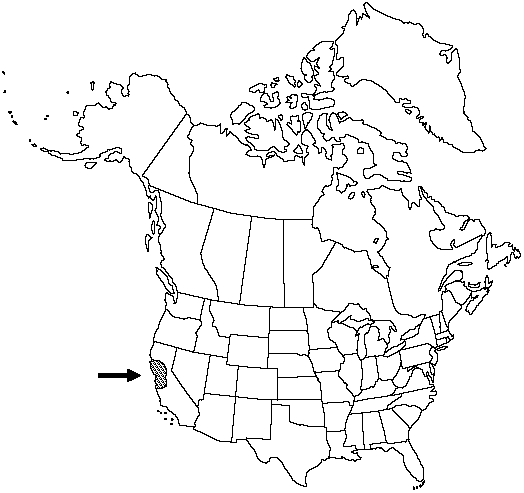Difference between revisions of "Aspidotis carlotta-halliae"
Amer. Fern J. 58: 141. 1968.
Endemic
Basionym: Cheilanthes carlotta-halliae W. H. Wagner & E. F. Gilbert Amer. J. Bot. 44: 738, figs. 1b, 2b, 2e. 1957
Treatment appears in FNA Volume 2.
FNA>Volume Importer |
imported>Volume Importer |
||
| (7 intermediate revisions by 2 users not shown) | |||
| Line 7: | Line 7: | ||
|year=1968 | |year=1968 | ||
}} | }} | ||
| − | |basionyms={{Treatment/ID/ | + | |special_status={{Treatment/ID/Special_status |
| + | |code=E | ||
| + | |label=Endemic | ||
| + | }} | ||
| + | |basionyms={{Treatment/ID/Basionym | ||
|name=Cheilanthes carlotta-halliae | |name=Cheilanthes carlotta-halliae | ||
|authority=W. H. Wagner & E. F. Gilbert | |authority=W. H. Wagner & E. F. Gilbert | ||
| + | |rank=species | ||
| + | |publication_title=Amer. J. Bot. | ||
| + | |publication_place=44: 738, figs. 1b, 2b, 2e. 1957 | ||
}} | }} | ||
|synonyms= | |synonyms= | ||
| Line 19: | Line 26: | ||
}}<!-- | }}<!-- | ||
| − | --><span class="statement" id="st- | + | --><span class="statement" id="st-undefined" data-properties=""><b>Leaves </b>monomorphic or weakly subdimorphic, 10–30 cm. <b>Blade</b> 4-pinnate, 3–12 cm, nearly as wide as long, thin to thick. <b>Ultimate</b> segments narrowly lanceolate to deltate, 2–6 mm; midrib obscure or evident abaxially. <b>Sori</b> of mature blades ± discrete to usually subcontinuous, 3–7(–9) per segment; indusia semicircular to usually elongate and connecting several adjacent sori, margins with 6–10 irregular and prominent teeth and/or lobes. <b>2n</b> = 120.</span><!-- |
-->{{Treatment/Body | -->{{Treatment/Body | ||
|distribution=100–1400 m;Calif. | |distribution=100–1400 m;Calif. | ||
| − | |discussion=<p>Aspidotis carlotta-halliae is a fertile allotetraploid species derived from hybridization between A. californica and A. densa. Occasional sterile backcrosses are found.</p><!-- | + | |discussion=<p><i>Aspidotis carlotta-halliae</i> is a fertile allotetraploid species derived from hybridization between <i>A. californica</i> and <i>A. densa</i>. Occasional sterile backcrosses are found.</p><!-- |
--><p>Generally on serpentine slopes, in crevices, and on rock outcrops</p> | --><p>Generally on serpentine slopes, in crevices, and on rock outcrops</p> | ||
|tables= | |tables= | ||
| Line 33: | Line 40: | ||
-->{{#Taxon: | -->{{#Taxon: | ||
name=Aspidotis carlotta-halliae | name=Aspidotis carlotta-halliae | ||
| − | |||
|authority=(W. H. Wagner & E. F. Gilbert) Lellinger | |authority=(W. H. Wagner & E. F. Gilbert) Lellinger | ||
|rank=species | |rank=species | ||
| Line 44: | Line 50: | ||
|publication title=Amer. Fern J. | |publication title=Amer. Fern J. | ||
|publication year=1968 | |publication year=1968 | ||
| − | |special status= | + | |special status=Endemic |
| − | |source xml=https:// | + | |source xml=https://bitbucket.org/aafc-mbb/fna-data-curation/src/2e0870ddd59836b60bcf96646a41e87ea5a5943a/coarse_grained_fna_xml/V2/V2_220.xml |
|genus=Aspidotis | |genus=Aspidotis | ||
|species=Aspidotis carlotta-halliae | |species=Aspidotis carlotta-halliae | ||
| − | |||
| − | |||
| − | |||
| − | |||
| − | |||
| − | |||
| − | |||
| − | |||
| − | |||
| − | |||
| − | |||
| − | |||
| − | |||
| − | |||
| − | |||
| − | |||
| − | |||
| − | |||
| − | |||
| − | |||
}}<!-- | }}<!-- | ||
-->[[Category:Treatment]][[Category:Aspidotis]] | -->[[Category:Treatment]][[Category:Aspidotis]] | ||
Latest revision as of 21:22, 5 November 2020
Leaves monomorphic or weakly subdimorphic, 10–30 cm. Blade 4-pinnate, 3–12 cm, nearly as wide as long, thin to thick. Ultimate segments narrowly lanceolate to deltate, 2–6 mm; midrib obscure or evident abaxially. Sori of mature blades ± discrete to usually subcontinuous, 3–7(–9) per segment; indusia semicircular to usually elongate and connecting several adjacent sori, margins with 6–10 irregular and prominent teeth and/or lobes. 2n = 120.
Distribution

100–1400 m, Calif.
Discussion
Aspidotis carlotta-halliae is a fertile allotetraploid species derived from hybridization between A. californica and A. densa. Occasional sterile backcrosses are found.
Generally on serpentine slopes, in crevices, and on rock outcrops
Selected References
None.
Lower Taxa
None.